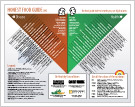
(Natural News)
The definitive list of international companies that have issued apologies to maintain their market access in China in recent years. Plus, a record of the even more widespread phenomenon of self-censorship for the Chinese market.
(Article by Lucas Niewenhuis republished from Signal.Supchina.com)
By now, pretty much everyone has noticed — or should have noticed — how much influence China holds over many international corporations.
Much of the awareness can be attributed to the ongoing NBA-China controversy, where a sports league known in the U.S. for its progressive values is being forced to stay deafeningly silent on the decidedly un-woke policies of the Chinese government in order to keep NBA basketball in Chinese stadiums and on Chinese TV.
But other brands of many types, ranging from fashion and luxury labels to hotel groups and even a medical device company, have all been strongly condemned by the Chinese government and on Chinese social media in the past few years. Increasingly, these companies have bent to pressure and issued apologies, some of them groveling, but almost all of them containing remarkably similar phrases about “respecting China’s territorial integrity.”
Before this summer, China’s two most commonly stepped-in political hotspots for international companies were Taiwan and Tibet. Now, Hong Kong has joined that list. With massive pro-democracy protests erupting in Hong Kong in June and continuing today, any activism — even perceived activism by brands — about the political future of that city by foreigners has become anathema to Beijing.
Tibet is officially an Autonomous Region of China, Hong Kong is a semi-autonomous Special Administrative Region, and Taiwan is a de facto independent country. But Beijing makes claims of total sovereignty to all these, and even the slightest suggestion that the regions should have more autonomy from Beijing or that — in the case of Taiwan — it should be treated as the de facto independent territory that it is, is viewed as a great offense by Beijing and many Chinese nationalists.
Without further ado, here is the list of companies that have apologized to China. The companies are listed in reverse chronological order of their apologies, with the most recent first. For each company, we note what Chinese social media (and sometimes the government) took offense at, and when the company apologized, with a link to their apology.
Think we missed an apology? Let us know at [email protected] and we can add it to the list.
Below this list is a separate record of companies that are known to self-censor, or have been forced to censor for China, but have not issued apologies to China.

Dior, French luxury goods company
Offense: A Dior employee giving a presentation in China showed a map of China that did not include Taiwan.
Apology: October 17, 2019: “Dior…strictly upholds China’s sovereignty and territorial integrity” (link in Chinese).

NBA, American basketball league
Offense: A tweet by Houston Rockets General Manager Daryl Morey supporting the Hong Kong protests.
Apology: October 6, 2019: “We are extremely disappointed in the inappropriate remarks of Houston Rockets General Manager Daryl Morey. He has undoubtedly severely hurt the feelings of Chinese fans” (link in Chinese).

Swarovski, Austrian jewelry company
Offense: Listed Hong Kong as a country on its website.
Apology: August 13, 2019: “Swarovski has always resolutely upheld China’s sovereignty and territorial integrity” (link in Chinese).

Valentino, Italian fashion house
Offense: Listed Hong Kong and Taiwan as separate regions from China on its website.
Apology: August 13, 2019: “We resolutely respect and uphold China’s sovereignty and territorial integrity” (link in Chinese).

Calvin Klein, American fashion brand
Offense: Listed Hong Kong and Taiwan as separate countries or regions on its website.
Apology: August 13, 2019: “Calvin Klein completely respects and supports China’s sovereignty and territorial integrity” (link in Chinese).

Coach, American luxury accessories brand
Offense: Had Hong Kong and Taiwan listed as regions separate from “China” on its website; sold a T-shirt that had “Hong Kong” without a country listed after it, and “Taiwan” listed after “Taipei.”
Apology: August 12, 2019: “Coach consistently respects and upholds China’s sovereignty and territorial integrity” (link in Chinese).

Fresh, American beauty brand
Offense: Listed Hong Kong as a separate region on its website.
Apology: August 12, 2019: “Fresh…resolutely upholds China’s sovereignty and territorial integrity” (link in Chinese).

ASICS, Japanese footwear brand
Offense: Listed Hong Kong and Taiwan as countries on its website.
Apology: August 12, 2019: “Hong Kong and Taiwan are inalienable parts of China’s territory” (link in Chinese).

Givenchy, French fashion house
Offense: Sold a T-shirt that had “Hong Kong” without a country listed after it, and “Taiwan” listed after “Taipei.”
Apology: August 12, 2019: “Givenchy consistently respects China’s sovereignty” (link in Chinese).

Versace, Italian fashion house
Offense: Sold a T-shirt that did not say “China” after “Hong Kong.”
Apology: August 11, 2019: “Versace affirms that we ardently love China, and resolutely respect China’s territorial integrity and national sovereignty” (link in Chinese).

Coco, Taiwanese milk tea brand
Offense: A receipt in one of its Hong Kong branches included a message of support for protesters.
Apology: August 9, 2019: “Hong Kong is an inseparable part of the People’s Republic of China. There is no room for uncertainty” (link in Chinese).

Yifang Taiwan Fruit Tea, Taiwanese milk tea brand
Offense: Some employees from its Hong Kong branches joined strikes in the city.
Apology: August 5, 2019: “[We] resolutely uphold ‘One Country, Two Systems’ and resolutely oppose violent strikes” (link in Chinese).

McDonald’s, American fast-food chain
Offense: Showed an advertisement, in Taiwan, that included a two-second clip of a student ID card that showed Taiwan as a country.
Apology: January 19, 2019: “We have always supported the one-China policy and continue to uphold Chinese territorial sovereignty” (link).

85°C Bakery Café, Taiwanese bakery chain
Offense: Being visited by Taiwanese President Tsai Ing-wen at a store in Los Angeles.
Apology: August 15, 2018: “This company firmly supports the 1992 Consensus” (an agreement that there is only “One China,” which Tsai Ing-wen has not endorsed) (link in Chinese).

Gap, American fashion brand
Offense: Sold a T-shirt with an image of China that did not include Taiwan.
Apology: May 14, 2018: “Gap Inc. respects the sovereignty and territorial integrity of China” (link).

Mercedes-Benz, German automaker
Offense: Quoted the Dalai Lama on Instagram.
Apology: February 6, 2018: “This morning, we released a very incorrect message on international social media” (link in Chinese).

Medtronic, American medical device maker
Offense: Listed Taiwan separately from China on its website.
Apology: January 15, 2018: “Medtronic fully understands the Chinese government’s position on the relevant territorial issues and sincerely apologizes” (link).

Marriott International, American hotel group
Offense #1: Listed Tibet, Hong Kong, Macau, and Taiwan as separate countries in a customer questionnaire.
Offense #2: The company’s Twitter account for its loyalty program had “liked” a post by Friends of Tibet, which campaigns for independence for the region.
Note: See below to read about Marriott’s groveling apologies.

Zara, Spanish fashion brand
Offense: Listed Taiwan as a country on its website.
Apology: January 12, 2018: “Our company’s…website incorrectly referred to Taiwan as a ‘country.’ We express our sincerest apologies for this” (link in Chinese).

Delta, American airline
Offense: Listed Taiwan and Tibet as separate countries on its website.
Apology: January 12, 2018: “It was an inadvertent error with no business or political intention, and we apologize deeply for the mistake. As one of our most important markets, we are fully committed to China and to our Chinese customers” (link).
Note: See below for more information on self-censorship by airline companies.

Audi, German automaker
Offense: Used a map of China that excluded Taiwan and parts of Tibet and Xinjiang at a presentation at its headquarters in Germany.
Apology: March 15, 2017: “An incorrect geographical map was included in a speech presentation. This hurt the feelings of Chinese people. This was a serious mistake for which Audi wants to sincerely apologize” (link).
The humiliation of Marriott hotel group
Before the NBA, Marriott hotel group was the most extreme example of an American company apologizing to China. After Chinese internet users discovered in January 2018 that Marriott had sent out a customer questionnaire that listed Tibet, Hong Kong, Macau, and Taiwan as separate countries, the Shanghai office of the Cyberspace Administration of China blocked the company’s website and app for a week. It was during that blackout that Chinese internet users additionally discovered that Mariott’s loyalty program Twitter account had “liked” a tweet by Friends of Tibet, which campaigns for independence for the region.
To redeem its damaged status in the Chinese market, Marriott groveled hard. On January 12, the hotel chain sent out a statement that read, “Marriott International respects the sovereignty and territorial integrity of China. We don’t support separatist groups that subvert the sovereignty and territorial integrity of China.” The company also fired the poor hourly social media manager in Nebraska who was responsible for the Twitter activity, and the company’s president added on January 13, 2018: “Our official [Twitter] account wrongly ‘liked’ the tweet supporting Tibet independence and misled the public” (link).
But Marriott went even further in its apologies, on January 17 issuing an “eight-point rectification plan” promising to follow China’s laws more closely (link in Chinese). The managing director of Marriott’s Asia-Pacific office also told Chinese state media China Daily, “This is a huge mistake, probably one of the biggest in my career.”
Earlier apologies, half-apologies, and coerced censorship
There are earlier examples of international companies apologizing to China, going back to the early 2000s — see the Hong Kong Free Press for a timeline. But the offenses before 2017 were not as often about Beijing’s territorial claims, and the apologies were not always as groveling. For example, in 2007, American toy manufacturer Mattel apologized to the Chinese people for blaming a lead paint problem in its products on its China suppliers, and the harm to the “reputation of Chinese manufacturers” that this had caused.
A few other companies, including Dolce & Gabbana and Audi, have apologized in recent years for racist or sexist ads in China, though this is a much less China-specific kind of corporate mistake and apology than stepping on territorial sensitivities.
There are also a few more recent cases of companies half-apologizing to China, but not exactly admitting any “error” or “mistake,” or specifically repeating Chinese government talking points. The two most notable in this category:
- MUJI, a Japanese lifestyle brand, has been targeted multiple times by Chinese nationalist outrage for different types of transgressions. In January 2018, catalogues from the company that “left the disputed Senkaku Islands off a map” were scrapped after complaints from Chinese officials. And in September 2019, the brand apologized for describing the location of an event in Shanghai as “in the French Concession” (??? f? z?jiè), following complaints from a number of internet users who slammed it for being culturally insensitive and disrespecting Chinese history. However, the company’s apology statement was general: “We had no intention of harming national sentiment or disrespecting Chinese culture and history.”
- Pocari Sweat, a Japanese sports drink company, withdrew ads from Hong Kong’s pro-Beijing TV station TVB in July, outraging Chinese nationalists. Its apology statement was also fairly generally worded, and without admitting error, stated, “We resolutely uphold ‘One Country, Two Systems’” (link).
Finally, there is another type of corporate maneuvering to maintain access in the Chinese market: self-censorship. It is sometimes difficult to tell whether companies self-censor because of direct orders from Chinese officials, or if they do so because they are proactively avoiding political sensitivities from Chinese nationalists.
One prominent instance of companies being forced to censor by Beijing, rather than self-censorship per se: In addition to Delta Air Lines, American Airlines and United Airlines, along with at least eight other international airlines — Air Canada, Lufthansa, British Airways, Qantas, Air France, Malaysia Airlines, Japan Airlines, and ANA — were all compelled by July 2018 to change how they listed places like Taiwan and Hong Kong on their websites so as not to imply they are separate from China. In May 2018, the Trump administration dubbed this “Orwellian nonsense.”
Read more at: Signal.Supchina.com
















